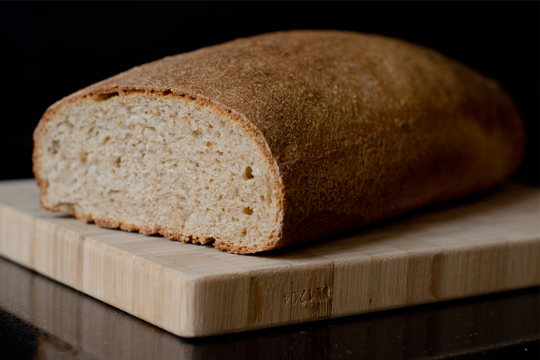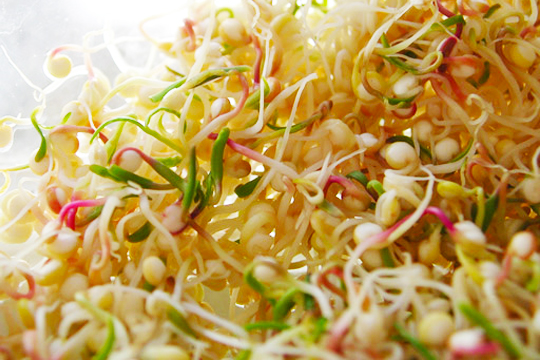
Reducing Food Waste in Foodservice
October 16, 2018 by Doreen Garelick, Dietetic Intern
Our intern Doreen attended a food waste summit for restaurants and compiled these tips to help food service operators redirect…
Nutrition 101
July 18, 2014

R.D. Kristy Del Coro breaks down the essential facts about sprouted grains and shares tips on how to incorporate these healthy grains into your diet.
Bread products made with sprouted grains are literally “sprouting” up everywhere. Moreover, they’re often associated with health claims such as “increased digestibility,” “increased absorption of minerals” and “increased antioxidants.” Today, I’m taking a look at the difference between regular grains and sprouted grains and whether or not the health claims hold true.
By definition, a grain is the seed of a plant -- typically a cereal grass -- and contains three edible parts: the germ, the endosperm and the bran. During processing of refined grains and flours, the germ and the bran are removed to increase shelf-stability. The germ and the bran are the parts that contain the majority of nutrients (including fiber, vitamins, minerals and antioxidants), which is why SPE always encourages consumption of whole grains in place of refined grains.
While there is no standard definition of a sprouted grain, they are best described as whole grains in the transition phase from seed to new plant. At just the right time, temperature and moisture level, the seed will begin to sprout. Eventually, if left in the right conditions, the sprouted seed would grow into a new plant.
The sprouted grain products on the market are produced in very controlled environments so that the sprouting is stopped at the right time: a grain that has been allowed to grow into a cereal grass has passed the point of human digestibility. There are two kinds of sprouting -- dry and wet.
Dry sprouting is when the grain is sprouted and then dried for longer shelf stability. The dry sprout can then be cooked or milled into sprouted grain flour. In wet sprouting, the sprouted grain is mashed into a thick purée. This wet mix can be incorporated into breads, muffins or other baked goods. These products are often labeled as “flourless” and sold frozen to prevent the product from turning rancid.
There is a limited but growing body of research around the health benefits of sprouted grains. Recent evidence shows that sprouting may increase many of a grain’s essential nutrients, including B-vitamins, Vitamin C, folate, soluble fiber and essential amino acids. Lysine, for example, is a vital amino acid that can be found frequently in high-protein foods like eggs and red meat, but is often limited in conventional grains.
A higher nutrient count among sprouted grains, then, could have important implications for those on a vegetarian or vegan diet. Another enzyme that can be elevated in sprouted grains is amylase, which breaks down starches into sugars. Increased levels of amylase could heighten a grain’s digestibility.
Additionally, there is some anecdotal evidence that individuals with mild sensitivities to gluten may digest sprouted grains better than unsprouted grains due to lower gluten content. Sprouting does not completely eliminate the gluten, though, so this would not apply to individuals with celiac disease or severe gluten sensitivity.

Lastly, as with soaking grains, sprouting is said to improve the “bioavailability” of certain grain nutrients by stimulating the breakdown of enzyme inhibitors such as phytic acid. In theory, the better the bioavailability of a certain food, the better your body will absorb minerals such as calcium, magnesium, iron and zinc (all of which are found in grains).
However, a definite conclusion remains elusive. There is no standard definition or regulation of sprouted grains related to the point in germination that the product is manufactured. As a result, the degree to which these nutrients are increased or decreased is less clear and may be inconsistent. Moreover, even if there are increased levels of nutrients, the difference may be too small to make a significant difference in the body.
In summary, choosing whole grains—whether sprouted or unsprouted—is always encouraged thanks to the variety of beneficial nutrients they contain. In reference to sprouted grains specifically, though, while there may be some added benefits to consuming this subcategory of grains and flours, the full extent of these benefits is still being researched.
One last note on food safety: the Food and Drug Administration (FDA) recommends that children, the elderly, pregnant women and persons with weakened immune systems avoid eating raw sprouts: the moisture content required for sprouting may pose a food safety risk if not well controlled.
There are a variety of whole sprouted grains and sprouted grains products available on the market, such as bread, rice, pasta and cereals.
Keep in mind that sprouted grain flours have lower protein levels and —more specifically -- lower gluten content. Because gluten contributes to the rising process in baked goods, the texture of sprouted grain breads may therefore be denser than that of typical breads.
Try sprouted grains for yourself with this healthy and delicious Sprouted Quinoa Salad recipe.
Do you cook with sprouted grains? Share some of your best tips and recipes in the comments below!

October 16, 2018 by Doreen Garelick, Dietetic Intern
Our intern Doreen attended a food waste summit for restaurants and compiled these tips to help food service operators redirect food waste from landfills.
Nutrition 101

Nutrition 101
September 26, 2018 by Doreen Garelick, Dietetic Intern
Ever notice headlines about rapid weightloss? Dietetic Intern Doreen Garelick looks deeper into a recent eye-catching headline to see if there's any truth behind it.
Connect
 Follow us on Twitter
Follow us on Twitter Friend us on Facebook
Friend us on Facebook Follow us on Pinterest
Follow us on Pinterest Follow us on Instagram
Follow us on Instagram Read our Blog
Read our Blog Watch videos on YouTube
Watch videos on YouTube Watch videos on Vimeo
Watch videos on Vimeo Connect with us on Linkedin
Connect with us on Linkedin Find us on Foursquare
Find us on Foursquare
Tweets by @SPEcertifiedBlog Search
Categories
SPE Certified Newsletter
Sign up for news on the latest SPE-certified venues, events and SPE updates.
We will never share your personal information with a third party.